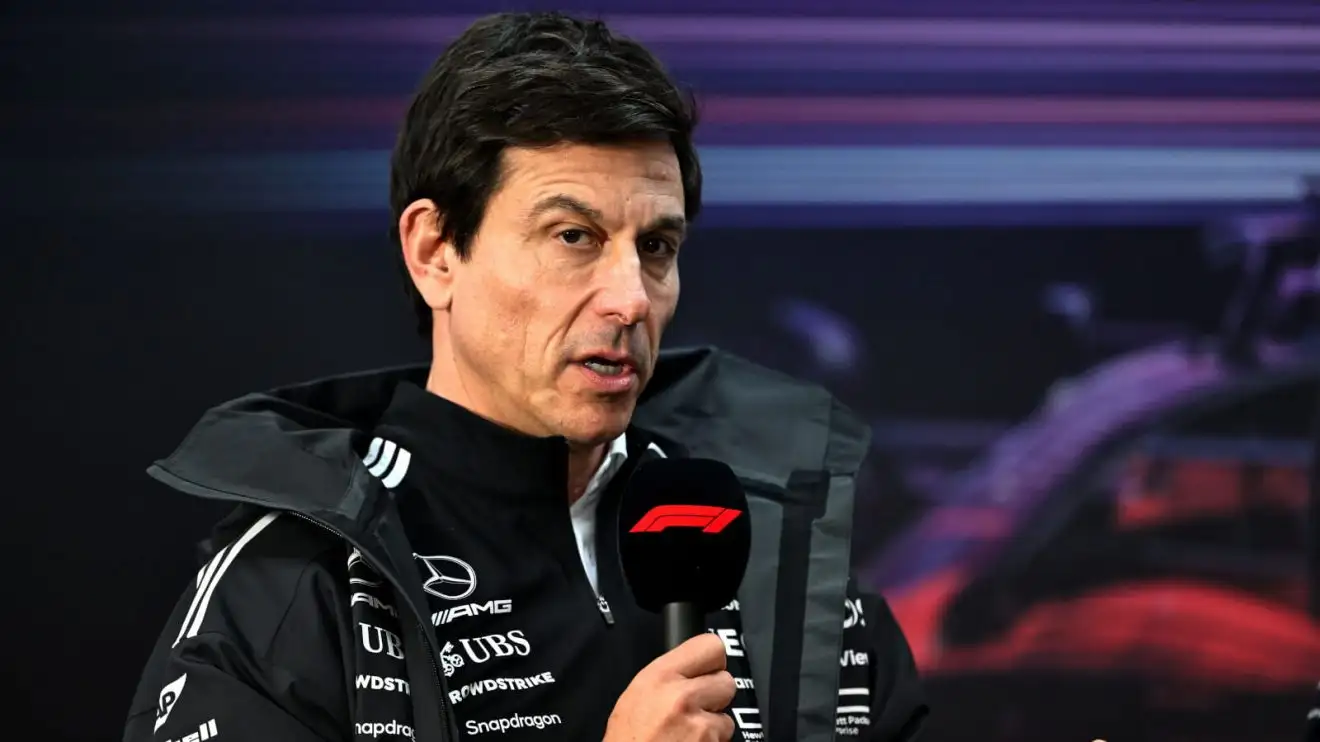Toto Wolff takes issue with ‘opportunistic thoughts’ on V10 debate
03 Mar 2025 3:05 PM

Toto Wolff in a press conference in pre-season testing
Toto Wolff has called talk of returning to V10 engines “opportunistic thoughts” after both FIA president Mohammed Ben Sulayem and Red Bull team boss Christian Horner said they were in favour.
12 years after Formula 1 first introduced turbo hybrid V6 engines in 2014, the sport is moving onto new power units next season.
Toto Wolff urges stakeholders to ‘talk up’ F1 2026 rule changes
Additional reporting by Thomas Maher
The new generation of smaller and lighter cars that will take to the grid in F1 2026 will be powered by engines that run on fully sustainable fuels and incorporate a 50/50 split between electric and engine power.
That should reduce fuel weights from around 110kgs to just 70, which will add to the weight-saving mandate, while the MGU-H has also been axed.
But while Formula 1 has taken huge strides towards designing more environmentally friendly power units, the old-school roar of the V10 engines is sorely missed by some.
Formula 1’s season of change: F1 2026 explained
👉 F1 2026: Confirmed teams and power unit suppliers for F1’s huge regulation changes
👉 F1 2026 tech analysed: The future of overtaking and biggest car advantage identified
One of those people is FIA president Mohammed Ben Sulayem, which has led to motorsport’s governing body establishing a working group to fully explore the possibility of putting V10s back on the grid.
The FIA told PlanetF1.com: “We are engaged in discussions with a number of stakeholders to determine the future technical direction of F1 beyond the 2026 regulatory cycle.
“A V10 power train running on sustainable fuel would be part of those considerations which would be tied to environmental and cost-containment measures. We need to consider the appropriate technical path for the sport.
“While we are fully focussed on the introduction of the 2026 regulations, and the prospect of the competitive racing they will bring, we also need to keep an eye on the future. The intention is to establish a working group whose brief it would be to explore all possibilities.”
Red Bull team boss Horner is in favour.
“Personally, from a sporting perspective, looking at what the future engine in Formula 1 should be beyond this next generation, I think, particularly with the way that sustainable fuel is going in, [it] does open up all kinds of opportunities,” he said.
“And I think, inadvertently, we’ve ended up with a very, very expensive, very complex engine from ’26 onwards – and I think the purist in me would love to go back to a V10 that was done responsibly with sustainable fuel, that reintroduced the sound of Grand Prix racing.
“It’s an interesting concept, and one to certainly look for, for after this current set of regs.”
However, his Mercedes counterpart Wolff has warned against even having the conversation as he feels it undermines the F1 2026 regulations even before the first wheel has been turned.
In a world in which Horner and Wolff don’t often agree, it’s not surprising that here too they have contrasting opinions.
“First of all, we should be excited, about these new regulations coming in next year. We should be talking them up. This is our sport. It is important to have the positivity about it that such an exciting motor comes into the car,” Wolff said.
“We are pushing the boundaries of battery technology on sustainability. It’s the first year we’re having 100 per cent sustainable fuel. Nobody knows how, where all of this is going to pan out. And that is really exciting that Formula One is trailblazing.
“So all of us stakeholders, I think we should be really cheering for this and making sure that the sport is perceived in such a high-tech way as it needs to be, and less driven by opportunistic thoughts.
“Number Two. This is a five-year cycle. There’s regulations in place whilst this is the journey onwards. Having a discussion about what comes afterwards, whether it is a V8, that we like a lot, that are maybe more road relevant than a V10 going forward.”
Wolff though, isn’t completely opposed to having the conversation, but says ahead of the first year in a five-year cycle, it is premature.
“I think it’s an exciting discussion to be had,” he continued. “What kind of hybrid system could be playing that role? Is that sound going to go up? All this is really an interesting conversation within a lifecycle of regulations, and that [it’s] worth it.
“But at the moment, I think it’s a bit premature. And we are at risk of diluting the messaging to the world if the year before we have even started these new exciting regulations, we talk about something that comes later.”
Read next: Joy for Carlos Sainz? Williams gains uncovered in F1 testing data analysis
Toto Wolff